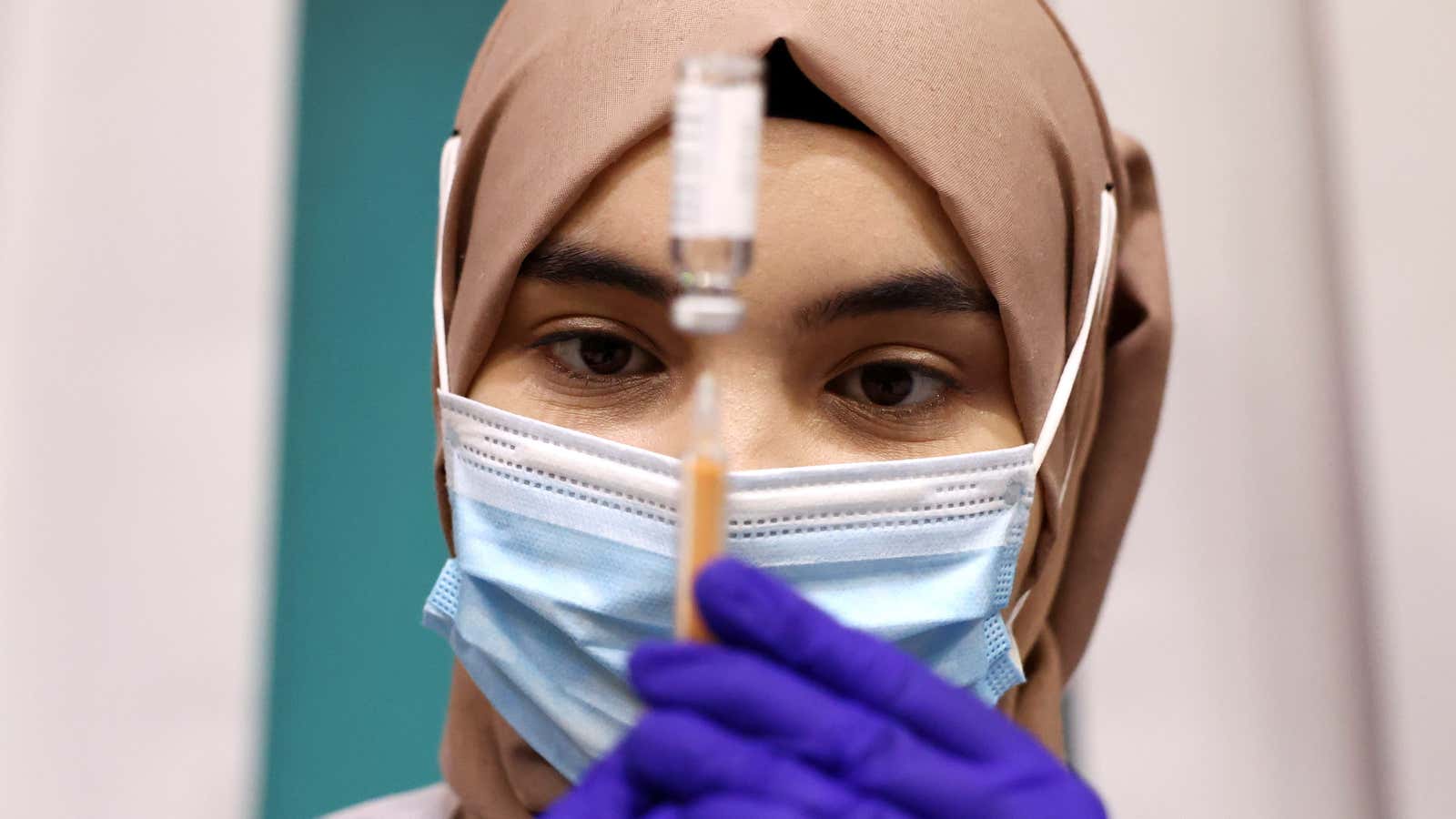From April 12, Muslims observe the holy month of Ramadan.
They fast from sunrise to sunset—this includes drinks and other substances, such as tobacco and non-essential oral medicine. For almost 2 billion people around the world, this raises the question of whether they should postpone getting a Covid-19 vaccine injection during the daytime till after Eid, when the new moon will mark the end of Ramadan.
Most Islamic scholars have said that vaccine injections are permitted during fasting hours, and should not be avoided during the coming month.
There aren’t many precedents of urgent vaccine drives that coincided with Ramadan in the past, but what little evidence we have suggests vaccine hesitancy might be high in the general population despite the scholars’ reassurances. Although Ebola vaccine drives organized in Guinea during the West Africa outbreak of 2014-2016 were accepted by 80% of scholars during Ramadan, for instance, only 40% of the general Muslim population felt comfortable receiving a vaccine that month.
Ramadan can help vaccine penetration
While Muslim religious leaders, doctors, and scientists are calling for their communities to get a vaccine, some politicians and activists are going further by advocating for tailored programs to give Muslims options to have access to shots outside of their fasting window.
In New York City, for example, local leaders have been asking to extend vaccination hours through the night, so that people could get their shots after sunset.
“While some Muslim observers of Ramadan may choose to get vaccinations during designated periods of fasting,” New York councilmen Mark Levine and Daneek Miller said in a letter to Mayor Bill de Blasio, “many have expressed concern over experiencing side effects of the vaccines (nausea, vomiting, light-headedness) during these periods, which may lead them to break their fast or forgo it completely,” the letter continued, adding that it was “unfair to force Muslim New Yorkers to make this choice.”
But the coming month could actually provide an opportunity to increase vaccination numbers.
Among minorities, and particularly in immigrant communities where non-English speakers fear they won’t receive enough support in their language to navigate the appointment, few people want to the vaccine appointment alone.
This could be more easily arranged if 24/7 vaccine sites were opened near mosques, familiar locations where people are likely to attend Ramadan services in groups, depending on the coronavirus rules in a given location.
“You could marry vaccine efforts with the togetherness of Ramadan—going [to get a vaccine] together in a year where you are forced to be apart,” says Mitra Kalita, the co-founder and publisher of Epicenter, a community news outlet coordinating a network of volunteers helping people navigate their vaccine appointments in New York.
The right vaccine, at the right time, in the right place
Making the vaccine available overnight near mosques would drive up vaccinations during Ramadan, and potentially after. But location and time isn’t the only issue to keep in mind.
For instance, restaurant workers in neighborhoods with large Muslim populations could be given vaccination priority, especially where there is a scarcity of doses available, as they will likely have to cater to larger crowds during the month.
In many cases, it isn’t even the vaccine itself that worries people, but the potential side effects.
“When you are starting the month of fasting, there’s a sense of resolve…So a lot of folks are trying to make sure that there are no disruptions during that period,” Luna Banuri, the Utah Muslim Civic League’s executive director, told the Associated Press. “Even if they believe that they can take the vaccine and it doesn’t affect their fast…(what) they’re not wanting to do is to get sick.”
While there is no way to ensure one won’t experience side effects, a solution might be administering vaccines that don’t need two doses within a short time window, such as Johnson & Johnson’s, which is a single shot, or AstraZeneca, which wouldn’t require a second shot within the month.
